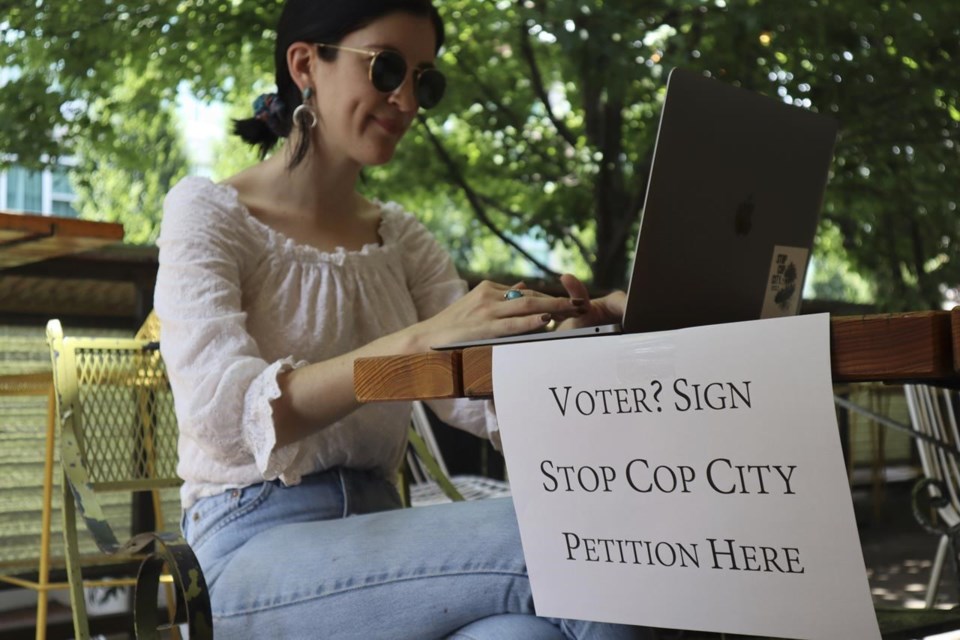ATLANTA (AP) — A federal judge on Thursday significantly extended the deadline for Atlanta organizers who have been trying to gather more than 70,000 signatures to force a vote on the construction of a police and firefighter training center that critics call “ Cop City.”
U.S. District Judge Mark Cohen ruled that the city had imposed an unlawful requirement that those collecting signatures have to be residents of Atlanta. A group of people who live in DeKalb County just outside the city had sued — saying they should be allowed to join in the canvassing effort and noting that the planned site for the training center itself is in unincorporated DeKalb County, outside the city limits.
“Requiring signature gatherers to be residents of the city imposes a severe burden on core political speech and does little to protect the city’s interest in self-governance,” Cohen wrote, adding: “The city has offered no specifics as to why permitting nonresident plaintiffs to gather signatures ... will cause any disruption to the political process.”
Cohen said that the 60-day period for gathering signatures, which had put the deadline in mid-August, should be restarted. That means organizers will have until late September to gather the tens of thousands of signatures still needed for the proposed referendum to get on the ballot.
The effort is meant to allow voters to choose whether they want to repeal the ordinance that authorized the lease of the city-owned land upon which the project is set to be built.
As of Tuesday, organizers had gotten more than 30,000 residents to sign on to the effort, according to Paul Glaze, a spokesperson for the Vote to Stop Cop City Coalition.
Attorneys for the city and state had urged the judge to toss the entire referendum campaign, calling it “futile,” and “invalid,” but Cohen declined to rule on its legality, saying it was not up to him to decide that separate dispute.
“We are thrilled by Judge Cohen’s ruling, and the expansion of democracy to include our DeKalb neighbors, and levels the playing field for our coalition,” said Mary Hooks, a lead organizer for the coalition. “Cop City has been marred time and time again by the silencing of democratic input and repression of community participation, and since the launch of this campaign, we have been playing on a field tilted in the city of Atlanta’s favor."
Asked whether officials plan to appeal the ruling, a spokesperson for Mayor Andre Dickens said officials are reviewing the judge's decision and will have more information later.
“The choice is simple,” the spokesperson said in a statement. “We can either have the best-trained firefighters and police officers or we can decide to settle for sub-par training conditions in sub-par facilities.”
Organizers have said they need to collect the signatures by Aug. 14 in order to make it onto the November ballot. If the signatures take longer to gather, that would push the referendum to March's ballot and potentially risk the city moving forward with constructing the facility in the meantime, though activists could seek a court order to prevent that from happening.
“We are focused on getting on the ballot, period,” Glaze told the Associated Press.
Dickens and others say the $90 million facility would replace inadequate training facilities, and would help address difficulties in hiring and retaining police officers that worsened after nationwide protests against police brutality and racial injustice three years ago.
But opponents, who have been joined by activists from around the country, say they fear it will lead to greater militarization of the police and that its construction will exacerbate environmental damage in a poor, majority-Black area. The “Stop Cop City” effort has gone on for more than two years and at times has veered into vandalism and violence.
Organizers have modeled the referendum campaign after a successful effort in coastal Georgia, where Camden County residents voted overwhelmingly last year to block county officials from building a launchpad for blasting commercial rockets into space.
The Georgia Supreme Court in February unanimously upheld the legality of the Camden County referendum, though it remains an open question whether citizens can veto decisions of city governments.
R.j. Rico, The Associated Press



